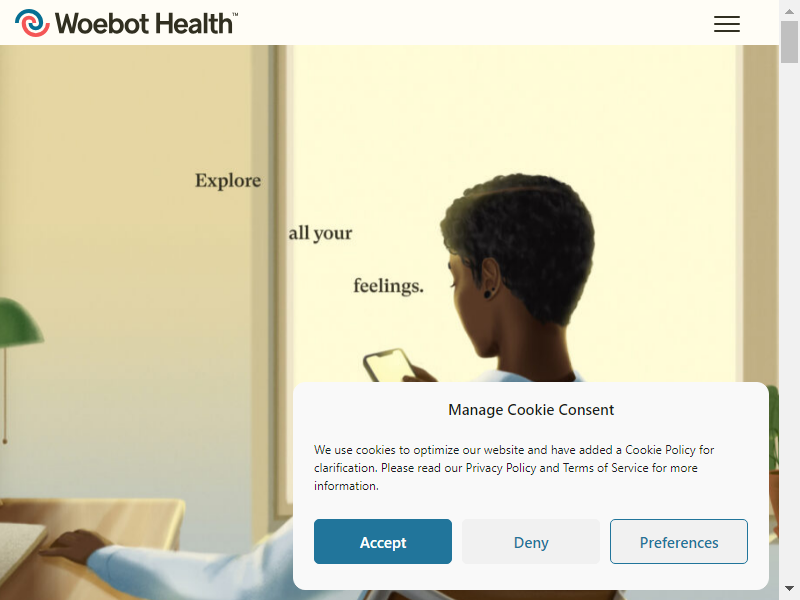
Woebot Health exists to transform global mental health by making evidence-based therapeutic support radically accessible to everyone through empathetic, AI-driven conversations. We envision a future where mental health care is seamlessly integrated into daily life, reducing stigma and bridging gaps in care with compassionate, scientifically validated technology.
Leveraging advanced conversational AI, real-time emotion analytics, and natural language processing, Woebot Health pioneers a new era of responsible AI in mental health. Our mission is to offer personalized, scalable support that adapts to diverse needs, empowering individuals while supporting healthcare ecosystems worldwide.
Our commitment extends beyond technology—by grounding our innovation in clinical rigor and human-centered design, we are building a future where emotional well-being is accessible, personalized, and deeply humane for all populations, including underserved and vulnerable groups.
Our Review
We've been tracking Woebot Health since 2017, and it's fascinating to see how they've evolved from startup to serious clinical player. What started as a clever AI chatbot has morphed into something much more ambitious — a full-fledged digital therapeutics company that's actually getting FDA attention.
The company's approach feels refreshingly honest about what it is and isn't. They're upfront that Woebot isn't a crisis service, and they've built in safeguards to detect concerning language and redirect users to appropriate help. That's the kind of responsible AI deployment we like to see in mental health.
What Makes Them Different
Most mental health apps throw around buzzwords like "evidence-based" without much substance. Woebot actually walks the walk. They're grounding their conversations in legitimate therapeutic frameworks — CBT, IPT, and DBT — and they've got clinical psychologists and conversational writers crafting the experience.
The real differentiator? They're not just another consumer wellness app. With $100+ million in funding and an FDA Breakthrough Device designation for their WB001 product targeting postpartum depression, they're playing in the regulated digital therapeutics space. That's a much harder game, but potentially much more impactful.
The Clinical Chops Are Real
We were genuinely impressed by their recent clinical study results. A 256-person trial showing significant reductions in depression and anxiety across diverse demographics isn't just marketing fluff — it's peer-reviewed evidence that this stuff actually works.
Their pivot into age-specific versions (adolescents, 65+, maternal health) shows they understand that one-size-fits-all doesn't cut it in mental health. Each demographic has unique challenges, and tailoring the experience makes sense.
Where We See Them Heading
The integration of large language models into their platform is intriguing. They're being cautious about it — which we appreciate — but if they can pull off generative AI safely in mental health, that could be a game-changer.
Their B2B strategy targeting health systems, payers, and employers is smart. Individual consumers might balk at paying for mental health apps, but organizations looking to support their populations? That's where the real money and scale opportunities lie.
Woebot feels like they're building something substantial here. Not just another chat app with a therapy coat of paint, but a legitimate clinical tool that happens to live in your pocket.
Feature
AI-powered mental health chatbot
Real-time support for anxiety, depression, and stress
Cognitive Behavioral Therapy (CBT), Interpersonal Psychotherapy (IPT), Dialectical Behavioral Therapy (DBT) based conversations
Conversational AI with real-time emotion analytics
Natural language processing to interpret user responses
Human-centered design for user experience
Responsible AI deployment with clinical and ethical oversight
Specialized versions for adults, adolescents, postpartum women, and older adults
FDA Breakthrough Device Designation for investigational digital therapeutic WB001
Integration of large language models (LLMs) to enhance therapeutic experience








